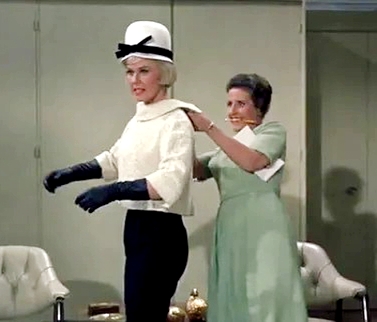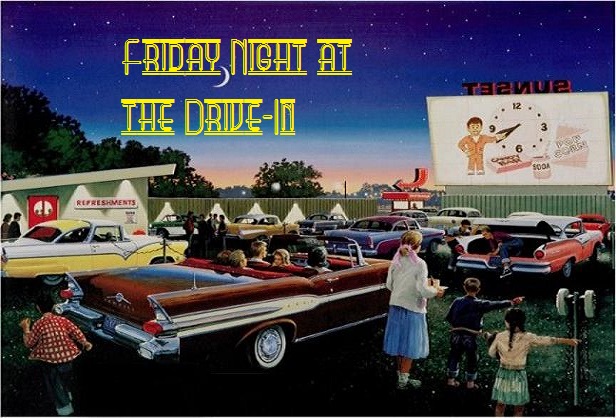 Sequels & remakes? Nothing new here – Hollywood’s been recycling stuff ever since the first “magic lantern shows.” Want proof? Let’s settle in to watch one of those terribly puritanical “sex comedies” from the Sixties – Lover Come Back!
Sequels & remakes? Nothing new here – Hollywood’s been recycling stuff ever since the first “magic lantern shows.” Want proof? Let’s settle in to watch one of those terribly puritanical “sex comedies” from the Sixties – Lover Come Back!
When Doris Day & Rock Hudson scored big at the box office with Pillow Talk in 1959, it was a no brainer to do it all again. A sequel was out of the question because Pillow Talk had ended with Doris & Rock embarking on the blissful sea of matrimony, so the “will-she-or-won’t-she come across” formula wouldn’t work. She’d already come across.
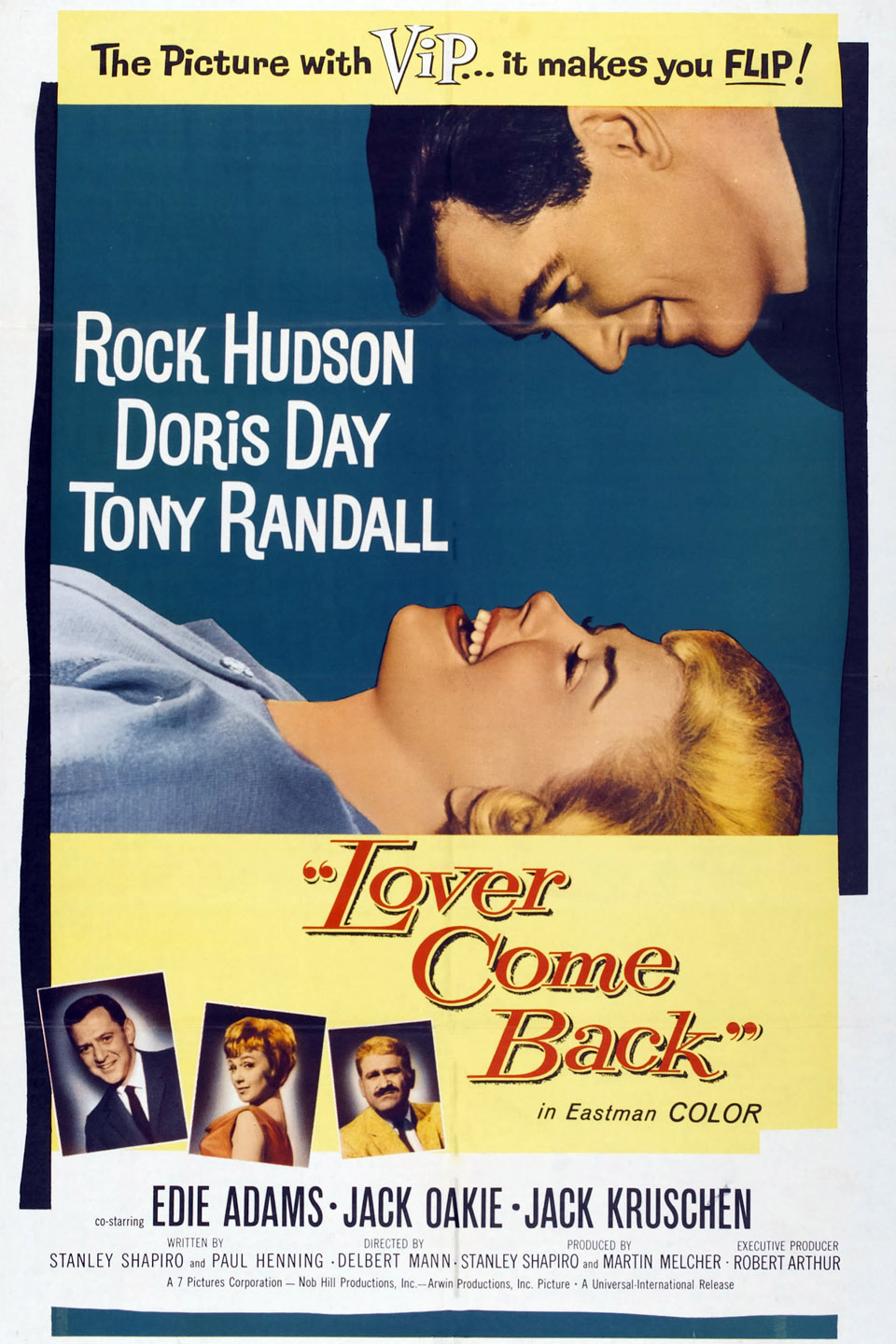 Two years later was too soon for a simple remake. So, Universal Studios decided to do a remake of the same basic elements, but with a twist. First, they reunited Pillow Talk’s top 3 stars, Day, Hudson and Tony Randall. They kept the setting in contemporary New York, but this time the plot involved the exciting and still relatively new to moviegoers (and hence, exotic) world of advertising. Think of this as Mad Men, only without the irony and played strictly for laughs.
Two years later was too soon for a simple remake. So, Universal Studios decided to do a remake of the same basic elements, but with a twist. First, they reunited Pillow Talk’s top 3 stars, Day, Hudson and Tony Randall. They kept the setting in contemporary New York, but this time the plot involved the exciting and still relatively new to moviegoers (and hence, exotic) world of advertising. Think of this as Mad Men, only without the irony and played strictly for laughs.
Hudson is high-powered ad man, Jerry Webster. He wins clients the old-fashioned way – taking them out, getting them drunk and buying them hookers (although because it’s still 1961, they’re referred to here as "showgirls,” wink, wink). Doris Day is his plucky adversary, rival ad woman Carol Templeton, fresh off the midwestern farm and loaded with scruples. Tony Randall plays Hudson’s boss, doing another variation on the metrosexual character he played for years before anyone knew what the hell metrosexual meant.
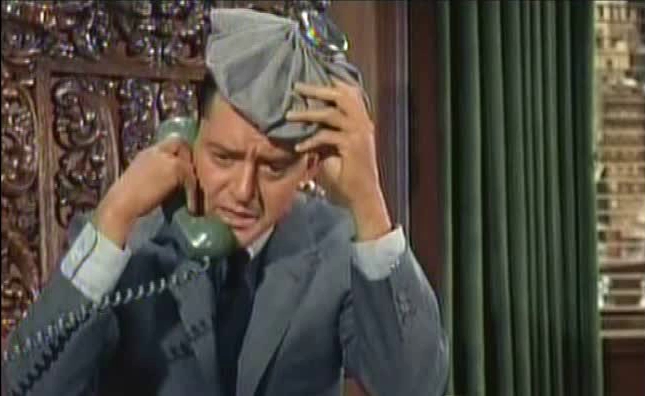
For some reason, Day is shocked, shocked I tell you, that an ad exec would take a client out & get them drunk & laid to land an account. And then the movie asks us to believe that her boss is also shocked and even more unbelievably, there would be some kind of Ad Council that would be aghast, aghast I tell you, at this kind of behavior. So, clearly, we’re dealing in a totally make-believe ad business in a New York that never existed anywhere except just east of Oz.
Anyway, without getting into the weeds of a very complicated plot, Hudson invents a totally made-up product. The next thing you know, Doris Day is determined to steal this fictional account from Hudson’s agency. And of course, she mistakes Hudson for the non-existent client – repeating Pillow Talk’s mistaken identity gambit.
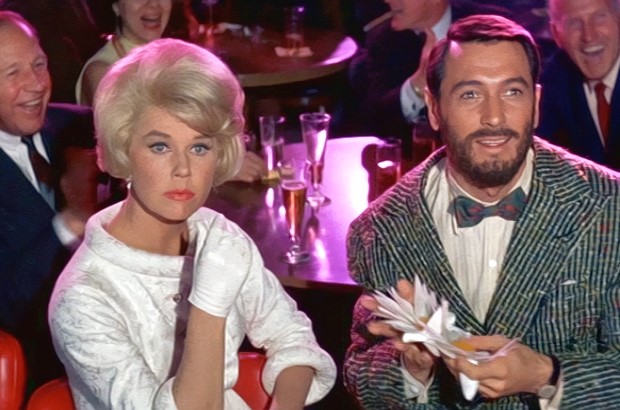 As before, the plot really centers on Hudson’s attempt to get perpetual virgin Day between the sheets while pretending to be somebody he’s not. Shockingly, she almost gives up the goods without the benefit of a marriage license. But the emphasis is on “almost” as this is still only one year after the birth control pill was first introduced. The sexual revolution was just in its infancy.
As before, the plot really centers on Hudson’s attempt to get perpetual virgin Day between the sheets while pretending to be somebody he’s not. Shockingly, she almost gives up the goods without the benefit of a marriage license. But the emphasis is on “almost” as this is still only one year after the birth control pill was first introduced. The sexual revolution was just in its infancy.
What makes this film extra fun is that it’s positively loaded with familiar faces, right down to the bit parts. Ann B. Davis (of Brady Bunch fame) play Day’s personal assistant. Muriel Cigar pitchwoman ("Why don't you pick me up and smoke me sometime?"), Edie Adams plays the key showgirl, Rebel Davis. Jack Albertson (Chico & the Man) has a recurring bit as a bystander constantly marveling at Rock Hudson’s way with the ladies. If you look quickly, you’ll also see Donna Douglas as a secretary at Hudson’s ad agency and even Ted Bessell (That Girl) in a two-line part as an elevator operator.
The film was co-written by Paul Henning, who went on to conquer the world of 60’s TV by creating The Beverly Hillbillies (where he gave Donna Douglas a much bigger role), Petticoat Junction & Green Acres.
Like its predecessor, Lover Come Back was a huge hit, grossing almost $17 million (a really big sum back in those days). It’s fun to watch today if only to gawk at the almost endless parade of ridiculous-looking hats Day wears thru the film and wonder how they ever could have been considered fashionable.
